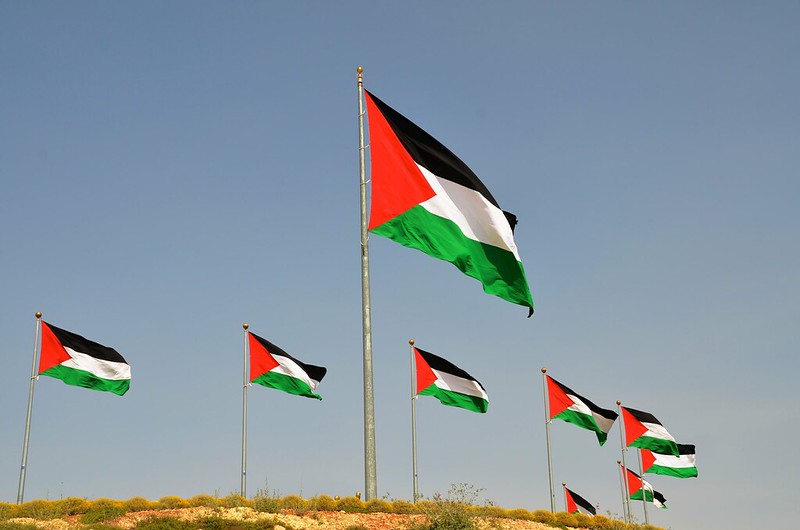- Palestinian Flag by scottgunn via Flickr CC BY-NC 2.0
Some seven years ago, developmenteducation.ie published a guide on the then situation in Gaza in 2014. Disgracefully, we find ourselves in much the same situation in 2021. Conflict is raging daily; deaths and injuries overwhelmingly among civilians continue to rise; the ‘international community’ continues to talk and prevaricate and much of the world continues to look away.
The current situation is but one moment in a conflict with a long local and international history. Understanding the origins, context and dimensions of the conflict will help us to ‘read’ what is happening and to interpret reporting on the conflict or more broadly on the region.
Below, we have included a series of references and links to assist you in exploring the issue.
An important starting point to stimulate reflection
‘First, never will even the most impressive television footage properly capture the depth of fear and despair felt in the homes and hearts of Gazans who are yet again facing death, devastation and displacement. Thousands of parents today have no more answers to give to their young children when they are asked why their houses are shaking or breaking under the weight and relentless force of the bombardments.
Second, we must be careful about the endless enumeration of casualty numbers. The dead and injured in Gaza are not anonymous. Behind the figures lie multiple individual destinies now torn apart. Too often in their lives have Gazan civilians been denied their dignity. Anonymity in death or injury is the ultimate denial. It is also too comfortable for the world and the parties engaged in the hostilities. Palestinians are not statistics and we must never allow them to be treated as such. They are human beings like others in the world, with their identity and the same hopes and expectations for an improved future for their children.’
This significant reminder by former United Nations Relief and Works Agency for Palestine Refugees in the Near East (UNRWA) Commissioner-General Pierre Krähenbühl during a press briefing on July 14th 2014 regarding events in Gaza highlighted an important but all too often forgotten reality. Behind the statistics and the propaganda, the claims and counter claims, the talk of ‘terrorists, self-defence and security’ are the lives (and now the continuing deaths) of Palestinians (overwhelmingly) and Israelis (no less important for their limited number).
Recent events are a grotesque reminder of a conflict that has rumbled on for over 60 years (see this BBC’s timeline which can be accessed year on year) especially for the 5 million plus Palestinian refugees in the West Bank, Gaza, Jordan, Lebanon and Syria. Although the figures are (inevitably) contested, it is generally accepted that some 15,000+ Palestinians and Israelis people have died since 1948 (for a detailed discussion, see the Global Avoidable Mortality statistics).
In the context of recent events, readers/users may find the following annotated list of (selected) websites useful in terms of background, analysis, links and perspectives. The list is in no way, comprehensive or complete; nor does it come devoid of criticism; it is offered as a starting point to stimulate discussion and debate.
Where to start learning
For background on the context of Gaza and its role in the broader conflict see this analysis from the Sky History website.
Despite being last updated in 2006, Global Issues provides an excellent historical overview divided into different time frames.
The US Council on Foreign Relations has a solid and informative review of the history and current status of the conflict on it Global Conflict Tracker website, including a striking slideshow and onward links to stimulate inquiry.
And beyond...
The official site of the United Nations Relief and Works Agency (established by the UN General Assembly in 1949, following the 1948 Arab-Israeli conflict to carry out relief and works programmes for Palestine refugees; its current mandate has been extended to 2017). The site contains analysis and commentary on current issues (e.g. Gaza 2021), a useful film archive, facts and figures in Palestinian refugees and basic demographics.
Maintained by one of Israel’s most respected human rights NGOs; B’Tselem offers a large body of material including videos, testimonies, photoblogs, maps and analysis; also offers an overview of key topics such as settlements, the ‘separation barrier’, demolitions, restrictions on movement etc. The site also analyses crucial issues such as the water crisis in Gaza and the West Bank (has an excellent background briefing) and how the current discriminatory situation flouts international law. Also has an extensive annotated set of links to an additional 17 Israeli human rights sites.
Independent Palestinian NGO based in Ramallah, West Bank; established in 1979, Al-Haq is recognised by the United Nations Economic and Social Council. The site contains extensive reports and analyses of current and key events (on Gaza, population, the Separation Wall, Jerusalem and a number of downloads including one on water discrimination.
Maintained by the Legal Centre for Arab minority Rights in Israel; Adalah contains a series of useful special reports on issues such as discriminatory laws, home demolitions, family reunification issues, attacks on human rights organisations and a series of briefing papersetc. Adaleh.org also has a limited multi-media section.
Independent US based international human rights NGO; Human Rights Watch the site has many detailed reports on a range of key issues such as land, human rights violations, threats to migrants, the illegal use of white phosphorous, discrimination against Palestinians in the Occupied Territories etc.
One of the best known Palestinian rights organisations, Palestinian Centre for Human Rights was set up in 1995 by a group of lawyers; the site carries a series of ‘In Focus’ briefing on key issues such as the War on Gaza, detailed legal human rights issues, debates on the Goldstone Report etc. There is also a set of special reports and briefing papers on additional issues such as the impact of events on children, education, health, women’s rights
Independent, pro-Palestinian site Visualizing Palestine focuses on providing first class infographics on the conflict; designed and supported by a network of researchers, designers, and activists based in Ramallah, Amman, Beirut, London and Paris; has a strong justice and human rights perspective. The site reviews a large range of issues from the Separation Wall to water discrimination, restricted professions for Palestinians, the peace talks, displacement etc.
The official site of the Israeli Ministry of Foreign Affairs; it contains useful background information on Israel’s history, its land, peoples and culture and a particularly useful section on historical documents and treaties etc. It also contains updates on the Israeli Government’s views on the current situation including briefings on issues such as the impact on children in Israel, the targeting of ‘houses’ in Gaza etc.
Excellent international human rights site maintained by the International Federation for Human Rights (FIDH); has a comprehensive section on North Africa and the Middle East which provides human rights focused commentary and analysis on the current situation in Gaza and the Occupied Territories. The site also contains detailed reports from member organisations in the area reporting on current events.
The Association for Civil Rights in Israel was established in 1972 and is the oldest and largest human rights organisation focused on the broad range of all rights and civil liberties issues in Israel and the Occupied Territories; it is independent and non-partisan. The site has a wide range of reports, analysis and briefings on issues such as housing, education, migrant rights, freedom of expression, children rights and social and economic rights etc. There is also considerable information on discrimination against Israel’s Arab minority.
Here is a profile of one of the most influential women in the Arab world and a major commentator and activist on the issue from Learning for Justice. Apart from telling her story, the piece also includes an excellent timeline associated with the issue. Learning for Justice (previously known as Teaching for Tolerance – one of our favourite websites) suggests the piece could be best used in education alongside this one on Shulamit Aloni, a well known Israeli activist on human rights. Both information pieces include reflection and debate questions.
National Geographic has produced 4 8-minute videos entitled The Conflict Zone by Aziz Abu Sarah, a Palestinian peace educator and travel writer in which he meets people on both sides of the conflict, to understand and communicate how this international dispute impacts their everyday lives. Apart from exploring the stories of those in the videos, Aziz Abu also explores the issue of reconciliation and soccer within that
From our archives...
More on developmenteducation.ie
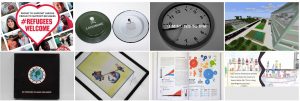
From Nicaragua to Ireland: Fairtrade Coffee and Global Solidarity
Fátima Ismael of Soppexcca, Cathal Murphy from Bewley’s and Fairtrade practitioner Kieran Durnien discuss 20 years of Fairtrade coffee solidarity linking Nicaragua and Ireland.
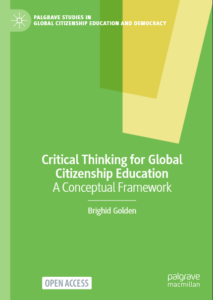
Critical Thinking for Global Citizenship Education
Join Brighid Golden for the launch of her latest book, ‘Critical Thinking for Global Citizenship Education: A Conceptual Framework’
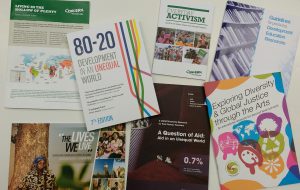
Your voice matters – 2026 user survey open
It’s January, its 2026, and we want to hear what you’d like us to feature or work on in 2026.

Calling Post Primary Teachers – Survey Participation Request
Your voice is vital in shaping the future of education for sustainable development in Ireland. Join a national survey for post primary teachers in October, led by DCU researcher Valerie Lewis

Webinar: Science for development on World Food Day
The webinar will feature YSTE projects, from Santa Sabina Dominican College (Dublin), Moate Community School (Westmeath) and CBS Thurles that focussed on nutrition and better food production, with Self Help Africa’s nutrition and gender specialist in Ethiopia, Sara Demissew.
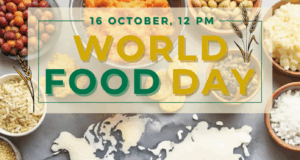
Student & teacher webinar: Food, hunger and SDG 2
Join the World Food Day webinar for post primary school students and teachers which will explore SDG 2: Zero Hunger.

